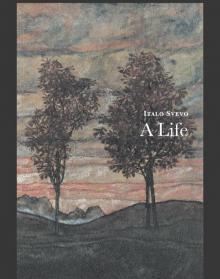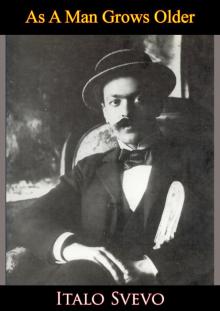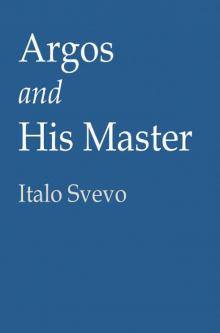- Home
- Italo Svevo
Argos and His Master Page 2
Argos and His Master Read online
Page 2
Several times, I saw the man and his little friend again, since they lived near where Titì’s place. I never followed them again, because smells you can forget, but not lashings.
III
A smell you can’t mistake is Titì’s, because there’s only one such smell in the world. Only one because you sometimes smell it even when the creature who gives it off isn’t there and hasn’t ever been by there.
I remember that one evening I was closed up in the kitchen with old Anna, who was crouching by the fireside. In my boredom, I was going back over my runs through the mountains with the master or on my own. I remembered the smells of prey and men and I was comfortable there watching Anna and resting. All of a sudden, I remembered that one time that I’d caught a whiff of a hare (a real path made by the quarry) I ran into Titì, drawn to the same smell, since Titì and I love the same things. Her smell, with its power, naturally covered that of the hare, which was left alone. All at once, at this recollection, I was unable to lie quietly in that kitchen, because Titì’s smell had come in through the closed doors and windows. I flung myself at the door to get to Titì, who, to be sure, had to be in the vicinity. Old Anna thought something completely different and sent me out. In the open, Titì’s smell was diffuse, as in the kitchen. All of the huge area spoke of her. I sniffed at the stupidest things and it was there; the wind brought it to me, and I turned to it to get closer to the creature I loved. But this time I got turned around, because the scent was coming from both right and left. Such a strong smell and Titì wasn’t there.
Titì is a bizarre creature, and she drives me crazy. Sometimes I sense that she, too, is a quarry, but the only one I don’t want to be sincere. May her sack of skin and fur so sweet to lick be preserved intact. I don’t snap and I don’t wag my tail, but I think I feel like doing both things at the same time, or like doing a third thing, exactly what I don’t know. Until now, she has avoided me, even though I don’t think I have ever done her any harm. She seems to be laughing when she leaves me alone with my tongue hanging out.
One day I was following the master on his slow walk when I ran into Titì: it was a great joy, and when it happens so unexpectedly it’s hard to believe. I went around her to make sure it wasn’t a sham. She really was the true source of that intoxicating scent. The master had stopped to talk with a woman (Argos says that I was sniffing that woman, but it’s not true, and I do not hesitate to make the correction. It was in fact a very old woman.) I immediately lost my head, because Titì seemed nicer and more docile than usual. “Never again will I be without you,” I thought. I grabbed her firmly but was suddenly given a lashing that caused me to howl. I didn’t leave my love right away, and in fact I tightened my grasp, since I knew Titì was favorably disposed to the struggle; still, I looked back to see the enemy. It seemed to be the master. I suspected as much, but his smell wasn’t there. I swear that in that instant there was no smell but Titì’s: and I gnashed my teeth without hesitation or reserve, the way you’re supposed to when you’re in great danger. A hail of lashings, which ended up knocking Titì and me over, came crashing down. Even on the ground I kept a grip on my prey; but she must have taken some of the blows meant for me, and having wriggled out of my embrace she fled with her tail between her legs. I snarled and howled. I was suffering such pangs of love and pain I couldn’t get up. I ended up finding the master’s scent again. It was whole by then and I couldn’t understand where he had kept it until then. I huddled meekly at his feet and let him go on thrashing me as he must have thought I deserved. But if he doesn’t want to have anything to do with Titì, why is he stopping me? There will come a time when he’s not there, and then it won’t matter to him, the way nothing ever matters to him when he’s not there.
IV
Only Argos suffers. In all of the bright and beautiful world there is no other suffering. Smells don’t suffer, and animals always have the same smell, whether they are sincere or clothed. When they are sincere their smell becomes intense and comes with— But how different Argos is every day!
When I get chained down I die of boredom. The wind makes it over and around the outer wall and I catch the vague smells that are shouting all together and making a racket that drives me crazy. Oh! If only I could get to that spot there on the wall where the smells are still separate. Argos needs to know. It’s not a cat, which needs only to hide. To cheat boredom, I sniff the chain and the doghouse and learn only what, unfortunately, I already knew: namely, that I have been on that chain and in that doghouse. And I cry more then: over the past and over the present. What I give to things isn’t a smell, but it’s still clear. “You and always you are here again,” they say. I howl on the chain. I shout for people to give me freedom and for the smells to come down to me. Men and smells, which know no pain, pay me no heed.
The chain and the muzzle are for Argos alone. The muzzle is a piece of prey that is neither clothed nor sincere. I don’t know what it could be. In any case, it’s a wall between me and the world, a fog that veils life or makes it less clear.
It’s true that near our dwelling is a dog who is on a chain the whole day. But he doesn’t suffer from it. He certainly is an odd one! I don’t know his name and I think he might not have one. What good would a name do him since it’s clear it wouldn’t occur to anyone to call him, seeing as he couldn’t come running? He sleeps most of the day. When he’s awake he moves as far away from his bed as the chain will let him and is content to sit on his hind legs watching all the things that don’t have chains.
He gets angry only when he sees me among the things without chains. I don’t think he has it in for me. The poor thing doesn’t know any better, and he thinks all dogs need chains. He thinks it’s a law. I normally go by him without giving him a look; but one day when I was with the master he started howling, and I was afraid the master would listen to his advice to put me on a chain. I attacked him, and to shut him up I went after his neck. I found my mouth full of hair alone, so he was able to get loose and knock me over. Fortunately, I managed such a bound that it was impossible for him, held back by the chain the way he was, to reach me. At that point, from a distance, I hurled threats and curses at him, while he responded with all of his hatred for me, a free creature. Now, every time I go by that dog, to make him feel the disadvantage of the chain, I provoke him from a suitable distance. He loses his voice in anger. I don’t get too close. There’s no point. He can be left master of that bit of land. Besides, he’s very strong, and his neck is protected by too much hair. I don’t understand how he could have knocked me over so easily. The chain must help him.
And Argos also has other pains that the rest of the world is unaware of and doesn’t experience. When he sees his master petting another dog, he is fonder of his master than usual, but this fondness is made up of pain. Why pet others? Doesn’t he have me? Maybe he does so so Argos will be nicer, and in fact if he wanted something from me just then I would obey more quickly than usual. But he doesn’t want anything from me, and he goes on petting the other dog. My hatred of this other dog is also made up of pain. It’s not allowed to tear him to pieces, because the master is around, and besides I’m afraid of showing him my anger, since he might delight in it. I get between that intruder and my master to separate them, because if they’re separated I stop suffering and I get between them as if by chance. The master drives me away, but I stubbornly keep invading that small stretch of ground and wagging my tail, feigning a joy I am very far from feeling. Because the pain is this: I’d like to howl to relieve my spirit, but then there would no longer be any hope of driving that ugly creature away from my master. You have to hide pain and try to get back in favor. Later, when the other dog has finally left, I get my master and his smell back whole. The other dog didn’t take any of it. “So it was stupid to suffer,” I say to myself then. But on the next occasion the very same thing happens, because Argos was made to suffer.
It is nonetheless also true that Argos is the only one who really knows how to revel and t
o laugh. When the master and I go out, especially during those moments I am let off the chain, my body becomes pure joy. I know that when the master wants to laugh he closes his eyes a bit and opens his mouth. But with me joy is something altogether different. I fling myself here, I fling myself there, and I bound about effortlessly. Sometimes not even the most painful lashing puts an end to the joy of freedom in the company of my master. When I am alone, the joy is the same, but I bound about less. I bound about for the master, so he will delight in it with me and realize he shouldn’t keep me shut in.
How beautiful a thronged road is! This stone received a visit from Titì, and in her smell I see her and embrace her. I look at the master to see if he has understood. He must not be aware of that smell because he’s not beating me. Then I forget about Titì because I know that in the company of my master there’s no enjoying her. A prey animal left a trail across the road. The master looks at me and then calls me over because he doesn’t have his shotgun. How many dogs have taken the road today! Three. At the foot of that tree trunk is a greeting from one of them. Where are you now, unknown friend?
But my master is walking in the middle of the road, not taking a single step aside to examine the smells. His senses are more powerful than Argos’s, and he doesn’t need to go over to them to delight in them.
V
Not far from our house is a large and deep ravine, and I love to rest by it. One day I saw that a man was going down and down, faster and faster, from the other side, which is steeper. He wasn’t walking on his legs. He stopped at a branch. He didn’t shout, because otherwise I would have shouted with him. He stayed there, wavering. Then the branch he had been holding onto snapped, and he disappeared into the bottom. I clearly heard the rustling of the branches and leaves on his way down. I wanted to follow him to see what he was doing in that place I consider mine. I was called back and didn’t think about it again.
But the next day the man down there was stinking like a mass of dead animals. He was, to be sure, lying in his own blood. I tried to follow the smell, which was calling me, but there was nothing doing. The master, who was of course smelling things out with me, didn’t want to. After another day or two, the scent was shouting and it got to me even at the chain, become even more annoying than usual, and when Anna let me off I, determined, wanted to satisfy my curiosity. I paid my food, which was already ready, no mind and ran to the ravine. Anna shouted, and I think the master may have whistled, too, but about that I’m not sure. I went down into the ravine, and I as a jumped from one stone to the next I smelled the man and his blood ever more clearly. Finally, there he was with his head split open! I started barking with joy, but then I heard the master’s clear and peremptory whistle. There was no mistaking it, and I had to obey. But with what pain after so much toil. I was about to go back when I spotted the man’s bloodstained cap. I took it in my mouth, and that way, since the smell was mine, it was easier for me to make it the long way back up.
The master seemed impatient but didn’t beat me. He took the cap to smell it better, and I thought he was analyzing that smell to see what I’d done and if I deserved a thrashing. But I couldn’t stop that man from going into a place of ours, and the master understood. In fact, he didn’t beat me. He didn’t want to give me the cap, which he held on to as it were his, as if it were a kill.
The next day I managed to escape old Anna again and go back to the ravine. There was something new! The smell was now scattered over the path I’d gone down the day before; I’d picked it up already on the main road, where there was even a drop of blood. Of course, that man had fled! In fact, at the bottom of the ravine that man wasn’t there, only his blood, which, dried, he hadn’t been able to take with him. And I went back up on the trace of that smell and I was so absorbed in my work I didn’t hear the master’s whistle. On the road I couldn’t tell if the smell was turning to the right or to the left and I was confused. But up top I unexpectedly found myself in front of my master. He didn’t beat me! In fact, he half closed his eyes and opened his mouth. And in my joy I forgot the man and the cap and bounded barking around my master, who petted me. That’s how I learned that some creatures, even after death, can still flee.
VI
How varied air is! On that crag there must be a big bird ripped up by a bullet. I don’t understand why it went to give off its sweet scent up there. I would have liked to climb up to it, and I tried, but I got called back. Men, who can smell from a long way away, don’t know that I have to get close to things to understand them better.
One day the master shot a very small bird, and I brought it to him. It was still fluttering merrily in my mouth, but it was so tiny it seemed like a small pile of lively feathers. The master took it and threw it away. Then snow fell and we didn’t go back out for several days. When we went back by there, I took the little bird out of the snow, since it had called me with its exquisite smell through the heavy coat that was covering it. I put it in my mouth and bore it triumphantly to my master. But the master didn’t want that smell to be taken from there, and he beat me until I opened my mouth and dropped the bird.
When the master wasn’t there and thus didn’t care, I would go back to that little bird. By then it had only down and quills and its small round head was eyeless and lying in rest. It smelled the way it did when it was alive, but so much stronger. Its life is a lot stronger now, to be sure, and it’s engrossed in silence to form a bigger bird. It will no longer be the small bird so fragile of wing that its flight can be cut short by a piece of lead shot ricocheting off of a tree branch. It will be a huge bird, and one day it will fly off, bearing its sharp odor through the sky. And to bring it down a little pellet will no longer do; it will have to be shot in the heart, the way my master knows how to do. And it will come down with its wings folded and its head bent beneath its body to seek new rest and a new life.
VII
Man is a much simpler animal than a dog, because he has a better sense of smell and he smells more easily. When he meets another man he touches his hand and seems almost not to care about what’s behind this hand. On the contrary, when Argos meets another dog, he carefully moves the toothy part of his own body over to the toothless part of the other dog and sniffs. He keeps an eye out and is quick with a threat. Then, if he’s a good devil, the other dog should show his trust and offers his rump up for Argos to complete an investigation of it. Finally, Argos, too, finds it only fair to submit to the same operation. Trouble arises when neither of the two wants to be the first to yield defenselessly to the inspection and they end up snapping at each other. Sometimes even an inspection begun with mutual benevolence can go badly. And then it’s hard to say why a fight breaks out. It’s a hostile smell that suddenly reaches your nose and throws your mind into confusion with hatred. “Am I finally finding you?” you ask each other, attacking with pleasure. And there’s a doubt about whether it really is that other dog, but that’s certainly what the smell is: hostile and unpleasant. And there’s no mistaking the smell, or at least it would take a long time to find out the truth, and it’s unwise to wait to be attacked. The smell speaks clearly: it compels you to attack or it causes you to foresee an imminent attack, which is the same thing. When the snapping starts, all doubts are cleared up. Perhaps wounds are of use to clarity. Spurting blood shouts out its intentions. One day I knocked down a dog and would have strangled him if the master hadn’t come up. I ran into that dog again one day the master wasn’t around and would gladly have attacked him. But he threw himself on the ground with his paws in the air and I, finding that his smell had changed, spared him, which goes to show that smells, too, can profit from a good lesson. Since then, every time I’ve met him, he has always meekly let me investigate him, and I’ve always found his smell good and friendly. But I don’t let him sniff me any longer. There’s no point, and it would be dangerous, because I know my smell hasn’t changed.
The sheep dog that goes by here every day got angry at me, knocked me over, and would have ripped up my
neck if both masters hadn’t intervened. I got up beaten to a pulp and protested at the top of my lungs at the injustice that had been done me. I also thought that I would get a chance to get revenge, because I wasn’t afraid of that dog and I could certainly still hold my own. Sometimes, in war, it’s a good tactic to let yourself be knocked down and be underneath, where your bite is more effective. Instead, when I saw him by my side again I thought there was no reason to fight. From the powerful smell he was giving off, it seemed to me more a desire to protect than to fight. It’s clear that smells have to be obeyed, and I rolled on my back with my paws in the air, knowing perfectly well he wouldn’t find any malice in me. In fact, he let me be, but he didn’t allow me to investigate him. There was no point. After all, I had already been able to make sure there was no ill will in him.
VIII
We received a visit: a stray dog! He told me that he often didn’t eat, but that he ran free, wherever he liked, every day. It must be beautiful to keep moving forward, always pursuing scents; but I can’t imagine a world without my master, and to keep moving forward I’d have to leave him, since men are very much rooted to the spot, and they wait for scents to come to them.
That small, white, curly-haired dog made a fine friend. It’s true that while he was around I could have bitten him, since he was getting petted by the master. But when he left I felt very lonely, and my desire to have him again was so strong that, if he had come back, I wouldn’t have kept him from stealing caresses meant for me. He was made especially for playing. He would let himself get knocked over without offering resistance because he had found out it was less tiring, and besides he fell over on his own, too, stumbling on all of the obstacles we have around the house. He hadn’t gotten used to the obstacles, since our house is less simple than the woods.

 A Life
A Life As a Man Grows Older
As a Man Grows Older Argos and His Master
Argos and His Master The Nice Old Man and the Pretty Girl
The Nice Old Man and the Pretty Girl